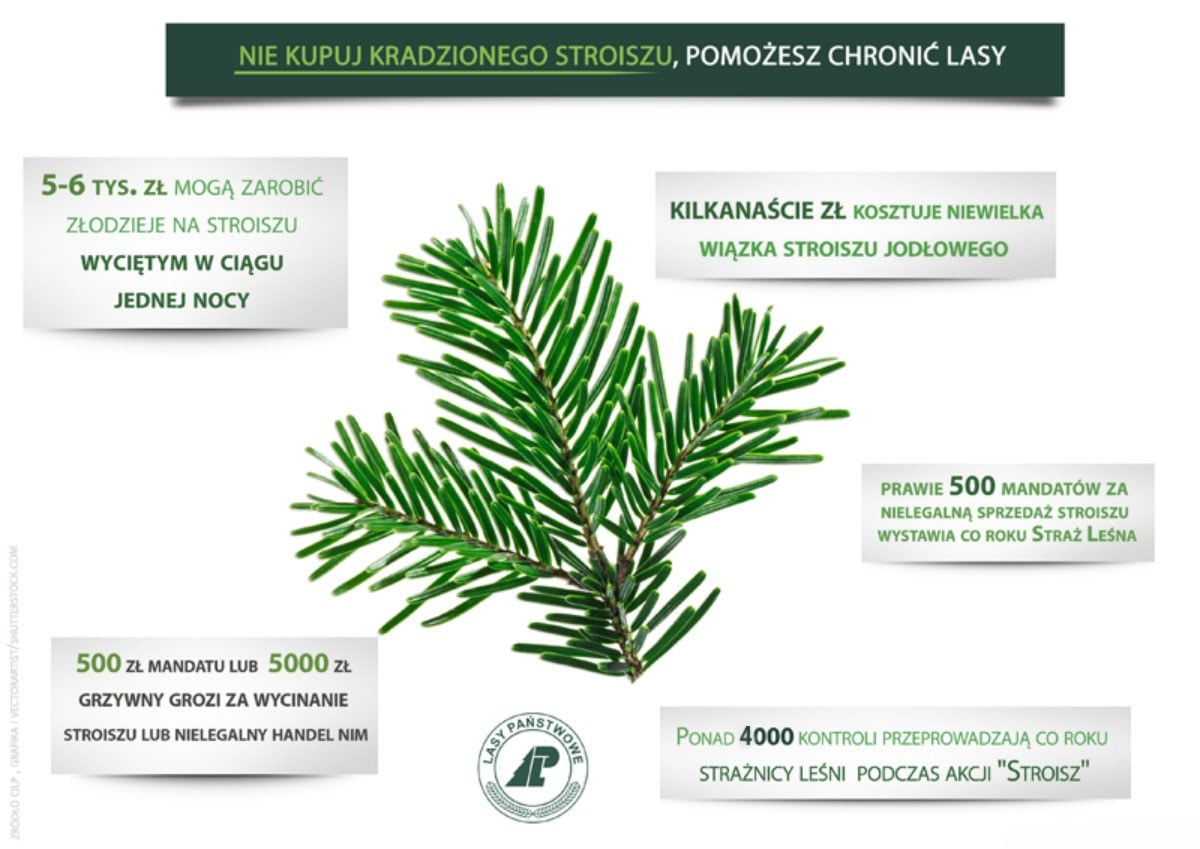Free firewood from the forest may not be worth it. The penalty depends on the number of branches.

- Thefts of branches for occasional wreaths and Christmas decorations are occurring on a mass scale.
- The value of the damage done to crops is many times greater than the market value of the stolen branches. Often, cutting a single branch into a single bundle means destroying the entire young tree.
- Each year, the Forest Guard conducts over 4,000 inspections and issues approximately 500 fines (up to 500 PLN) for illegally selling embellished items. The Forest Guard can also file a motion with the court to impose a fine of up to 5,000 PLN.
The turn of October and November is a time of particularly intense work for the Forest Guard and its collaborating services. This is thanks to the latest edition of the "Stroisz" campaign, which has just launched in the State Forests.
Its goal is to combat the illegal harvesting of coniferous branches used to make holiday wreaths and decorations. Every year, vast quantities of these decorations are stolen from forests, and the damage to crops is many times greater than the market value of the stolen branches.
According to calculations by the Regional Directorate of State Forests in Krosno , 13 cubic meters of reeds worth PLN 767 and stolen from the area of one of the local forest districts resulted in actual damage to the young forest amounting to PLN 10,745.
Unfortunately, the growing demand for fir is leading to increasing theft and destruction of young trees. Very often, cutting down a branch for just one bundle of fir means destroying the entire young tree—whether a fir or spruce. In some places, the scale of the destruction is so extensive that entire sections of young forest require replanting.
- summarizes Witold Białkowski, forester of the Runowo Forest District.
Foresters emphasize that there's no need to abandon ornaments made from reeds—it's important that they come from legal sources. Reeds can be obtained from plantations or through maintenance procedures conducted by the State Forests, such as thinning and clearing . Sellers of legal reeds have the appropriate documents confirming their origin.
Patrols in Polish forests and road checks beginAs part of the "Stroisz" campaign , the Forest Guard is conducting increased inspections in areas particularly susceptible to theft, as well as on nearby roads . The legality of the stroisz's origin is being verified and the movement of vehicles that may be transporting illegally harvested branches is being monitored.
Foresters are supported in their operations by modern technology, including forest cameras, camera traps, and drones. As every year, other uniformed services are also joining the effort to prevent forest damage as much as possible. Joint patrols, for example, by the Forest Guard and the police, also prevent poaching, littering, and illegal off-road rallies by motocross and quad bike riders.
- says Łukasz Przypaśniak, acting Chief Inspector of the Forest Guard of the General Directorate of State Forests.

Each year, the Forest Guard conducts over 4,000 inspections and issues approximately 500 fines (up to 500 PLN) for illegally selling embellished items. Furthermore, the Forest Guard can also petition the court for a fine of up to 5,000 PLN.
Brushwood is also a key element of forest management. Collecting it yourself can be quite expensive.Let us remember that small branches and tree parts (so-called " brushwood ", "branchwood" or "small branch material") lying in the forest are the property of the State Treasury and are subject to forest management conducted by the State Forests.
They cannot be collected and transported without prior consent of the forest district.
The forester indicates an area where the material can be collected— usually leftovers from forestry operations: branches, tree tips, and wood waste . The collected material must be placed in piles, and the forest district measures the volume and provides a valuation. Fees may vary by region , ranging from 20 to 60 PLN per cubic meter . Some forest districts also impose quantitative limits on the purchase of brushwood.
Article 120 of the Code of Petty Offenses states that the theft of timber from the forest is punishable by arrest, restriction of liberty, or a fine (if the value of the timber does not exceed 800 PLN). In addition, a fine of twice the value of the timber must be paid. Above 800 PLN, theft is punishable by imprisonment for 3 months to 5 years .
portalsamorzadowy

